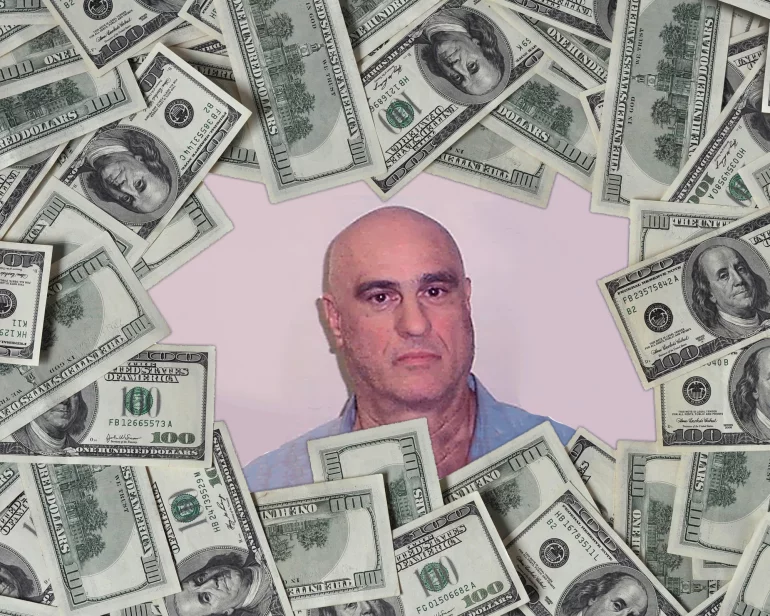Louis Colavecchio, famously known as "The Coin," was an American master counterfeiter whose criminal career primarily focused on producing highly convincing casino chips and slot machine tokens.
Born on January 1, 1942, in Rhode Island, Colavecchio's ingenuity allowed him to defraud numerous prominent casinos in Atlantic City, New Jersey, and Connecticut. His meticulous approach to counterfeiting earned him a notorious reputation within law enforcement and the gambling world, making him one of the most significant figures in casino fraud history.

The Rise of a Counterfeiting Mastermind
Colavecchio's background as a skilled jewelry maker and tool-and-die craftsman provided him with the perfect foundation for his illicit activities. He possessed the technical expertise to replicate intricate designs and metal compositions, which proved invaluable in his counterfeiting schemes.
His journey into large-scale casino fraud began with the production of slot machine tokens that were virtually indistinguishable from genuine ones.
Early Ventures and Techniques
Initially, Colavecchio started by studying authentic casino tokens. He would:
- Analyze their metallic composition.
- Examine the precise dimensions and weight.
- Reverse-engineer the intricate designs and security features.
Using specialized equipment, including an electric discharge machine typically used for jewelry molds, he was able to create hardened steel dies that perfectly mimicked the originals. This level of precision was key to his success, allowing his counterfeit tokens to be accepted by slot machines without issue.
Targeting Major Casinos
Colavecchio's counterfeit tokens infiltrated some of the biggest names in the gambling industry. His targets included:
- Caesars Atlantic City
- Other prominent Atlantic City casinos
- Foxwoods Casino in Connecticut
- Potentially other gaming establishments across the United States
He would often operate with a team, distributing the fake tokens across various machines. Casinos only began to suspect a problem when they noticed an unusual surplus of specific denomination tokens during their inventory checks, indicating that more tokens were entering the system than being legitimately purchased.
The Unraveling of the Scheme and Arrests
Law enforcement, in collaboration with casino security and gaming enforcement divisions, eventually caught on to Colavecchio's activities. The sheer volume of counterfeit slot tokens forced a concentrated effort to identify the source.
The First Major Arrest
In 1996, Louis Colavecchio was arrested at Caesars Atlantic City. Authorities discovered hundreds of pounds of his expertly crafted fake tokens. This arrest led to a significant conviction in 1998, where he was sentenced to seven years in federal prison for counterfeiting casino tokens. The bust was hailed as one of the most substantial counterfeiting cases in the history of legalized gambling in New Jersey.
Subsequent Offenses and Later Life
Despite his initial conviction and release, Colavecchio's counterfeiting career did not end there. He was arrested again in 2006 for resuming his activities, demonstrating a persistent inclination towards fraud. In later years, he also pleaded guilty to manufacturing counterfeit $100 bills, leading to another prison sentence in 2019. Colavecchio died in 2020 shortly after being granted compassionate release from federal prison due to health issues.
| Name | Return to player | Max payout | Variance | Soft | ||
| 99.07% | x1000 | Low |
|
Play | ||
| 99% | x12075 | High |
|
Play | ||
| 98.98% | x3843 | Middle |
|
Play | ||
| 98.72% | — | — |
|
Play | ||
| 98.67% | — | — |
|
Play | ||
| 98.6% | x670 | Low |
|
Play | ||
| 98.18% | — | Low |
|
Play | ||
| 98.13% | x15000 | High |
|
Play | ||
| 98.12% | x500 | Low |
|
Play | ||
| 98.12% | x2064 | Middle |
|
Play | ||
| 98.12% | x10000 | High |
|
Play | ||
| 98.11% | x7500 | — |
|
Play | ||
| 98.11% | x100 | Middle |
|
Play | ||
| 98.11% | x1500 | High |
|
Play | ||
| 98.1% | x2500 | — |
|
Play |
Impact on the Gambling Industry
The widespread success of Louis Colavecchio's counterfeiting operations had a lasting impact on the gambling industry. His crimes highlighted vulnerabilities in casino security and accelerated the shift away from physical tokens. In response to such sophisticated schemes, many casinos transitioned to paper vouchers or ticket-in, ticket-out (TITO) systems for slot machines. This change significantly reduced the risk of token counterfeiting, making it much harder for individuals like "The Coin" to exploit the system.
Louis Colavecchio's story remains a fascinating case study in criminal ingenuity and the constant battle between fraudsters and security measures within the gambling world. His ability to craft nearly perfect replicas forced casinos to innovate, ultimately changing how slot machine payouts and currency are handled today.


























